Sark
![]()
The title of this article is ambiguous. For other meanings, see Sark (disambiguation).
Sark ([sɑːk], French Sercq [sɛʀk], Sercquiais Sèr [sɛʀ]) is the fourth largest of the Channel Islands, with an area of 5.5 km². Populated by about 500 inhabitants (as of 2015), the island is part of the bailiwick of Guernsey. The Channel Islands are neither part of the United Kingdom nor crown colonies, but as crown dependencies (English: bailiwicks of Guernsey and Jersey) directly subordinate to the British Crown. To the west, in the immediate vicinity, is the smaller island of Brecqhou, politically part of Sark, whose owners seek independence from Sark. No cars are allowed on Sark, nor are there any asphalted roads.
Sark is sometimes characterized as the "last bastion of feudalism" but has transitioned to "democracy" in the past decade. "Until not so long ago, until 2008 to be exact, the Sarkees [...] were ruled by the last feudal state in Europe." In fact, fiefdom is the only form of land ownership here - and this has not changed to this day; "true land ownership does not exist." However, the practical relevance of this feudal system has been the subject of reforms over the last decade; in particular, since the first democratic elections in 2008, it no longer determines the composition of the island's parliament (see below).
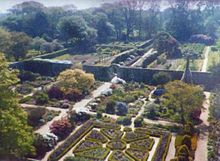
The gardens of the Seigneurie
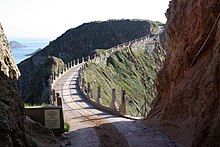
"La Coupée" between the two parts of Sark...
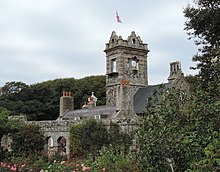
The Seigneurie - the manor house - on Sark
Geography
Sark consists of two high rocky islands, Great and Little Sark, connected only by a short ridge, La Coupée, up to 100 m high. La Coupée has only had a railing since 1900 and was turned into a concrete road by German prisoners of war in 1945.
The highest elevation on Sark is 114 m. The climate is uniform and similar to that of Devon and Cornwall. There is rarely frost in winter, but winter storms are sometimes strong enough to disrupt boat traffic. Tides play an important role; the Channel Islands have relatively strong tidal ranges and tidal currents. The installation of a tidal power station on Sark is therefore under discussion.
There are no towns on Sark, only clusters of buildings along the roads or near important points.
fauna and flora
Due to the insularity of Sark are peculiarities in the fauna: There are neither reptiles nor larger mammals here; rabbits and rats are currently the largest wild mammals. The hedgehog was only introduced in 1986. In contrast, the garden shrew, which is not found on Guernsey or in neighbouring Normandy, is found on Sark.
Population
There are about 500 people living on Sark in 2015. A census was last conducted in 1999. Of the 591 inhabitants at that time, 37.7% were born on the island. The age distribution was as follows (for comparison also the data of the Bailiwick of Guernsey and the Federal Republic of Germany):
| Sark | Guernsey ( | Germany ( | |
| 0–14 | 16 % | 14,6 % | 13,8 % |
| 15–64 | 61,3 % | 67,5 % | 66,2 % |
| ≥ 65 | 22,8 % | 17,9 % | 20 % |
When comparing the percentages, attention should be paid to the respective dates; the figures for Sark are nine years older than the others. The typical demographic changes (more older people, etc.) are already apparent for this period as well; thus the figures are not entirely comparable. Sark's significantly higher proportion of residents over 65 is only made more striking by this.
Language
The colloquial language on Sark today is English, partly the dialect of the Channel Islands. The place names in particular, however, point to the formerly dominant French language. Sark's original dialect (le Sercquiais) is a Norman dialect. Closely related to le Sercquiais is the western variant of Jèrriais spoken in Jersey, as most of Sark's settlers once came from Jersey. High French was used as the official and ecclesiastical language. In 1787 English is said to have been unknown on Sark. Sercquiais, originally divided into at least two dialect varieties despite the small size of the linguistic area, was the predominant vernacular of the local population before World War II. According to 1998 estimates, Sercquiais is now spoken by fewer than 20 people (3.3% of the population).
Religion
The inhabitants of Sark are predominantly Anglican. The Anglican Church of St. Peter (built in 1820, tower of 1883) is attached to the deanery of Guernsey, which in turn reports to the Bishop of Winchester. The seigneur, assisted by the dean and the parishwardens, undertakes the de facto selection of the priest. An important minority are the Methodists, who have been established on Sark since the late 18th century and have their own chapel (built 1924) and Sunday school premises.
Economy and infrastructure
Tourism plays an important role. It makes the number of inhabitants (normally 600) rise to over 1000 in the summer, appointments such as the repair of roads are also coordinated with it. On the roads there is neither asphalt nor lighting. Flying over the island is forbidden. Even before the Second World War, cars were declared illegal. Even tractors are only allowed for important business uses - they are not allowed to carry passengers, outside of the steep Harbour Hill. Horse-drawn carriages and bicycles are used as substitutes. Even the ambulance is pulled by a tractor.
Places of interest
In the heart of the island runs The Avenue, Sark's "main street". This area is home to many shops as well as some attractions:
- St. Peter's Church, built in 1820, during which time the British government had allocated money to build new Anglican churches to stem the spread of Methodism.
- A Methodist chapel, built in 1924 to replace an older building demolished (less centrally built in 1796).
- The prison, built in 1856 as a replacement for an older predecessor building
- A windmill, built in 1571, which the seigneur used for his milling monopoly until 1920. Even after that, the grain was still ground by the seigneur, albeit with more modern methods.
- Le Manoir, a building that used to be the seigneur's residence. The building was built by the first Seigneur Hellier de Carteret (Seigneur 1564/65-1581); the façade dates from 1810. There are other annexes at right angles, including an even older Seigneur's residence and premises that housed the island's church and school until the 19th century.
- Little Sark Dolmen
A little further off, to the northwest of the island, is the Seigneurie, the present manor house. This building originally belonged to the fief of La Perronerie and only became a Seigneurie in 1730 with the purchase of the island by the le Pelleys, the owners of La Perronerie. The original house on La Perronerie, which was of an older single storey type of house on Sark, was demolished in 1927. The oldest part of the building still standing today is two storeys and was built c.1675; its façade follows the pattern common in Jersey, like many of the houses built in the early 18th century and, compared with the older buildings, reflecting the increased prosperity of the island. Substantial additions were made in 1854, including a drawing room and the prominent tower. Largely from the 20th century, the Seigneurie's extensive grounds, which are open to tourists, feature a partly symmetrical garden with numerous exotic plants and some historic objects (guns, old telephone box, fruit mill).
Built in 2015, the small stone circle called Sark Henge in the south-east of the island is intended to commemorate the enfeoffment of Helier De Carteret by Queen Elizabeth I 450 years ago. The stone circle is a few metres in diameter and offers views of Derrible Bay.
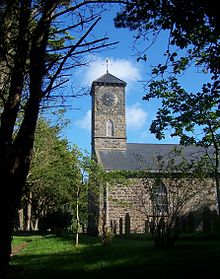
Anglican Church on Sark
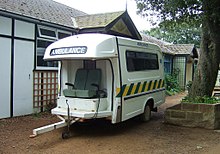
The ambulance pulled by a tractor
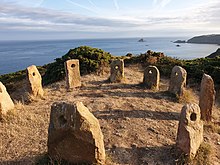
Sark Henge
Political system
The island's constitution dates back to royal charters of the 16th and 17th centuries (first in 1565) and has changed slightly over the centuries. In the 20th and 21st centuries it was enshrined in constitutional legislation and modified, first in the Constitution of 1922, last and most significantly in the Reform Law of 2008, last amended in 2013.
The following regulations, officers and institutions are important:
- The feudal system, involved
- the Queen of England
- the Seigneur of Sark (as Crown Vassal), currently Christopher Beaumont
- the tenants (as after-vassals)
- The autonomous position of Sarks within the Bailiwick of Guernsey
- The seneschal together with his representatives (whose court holds "all judicial power")
- The Chief Pleas as an elected parliament (which holds "all legislative and executive powers").
- Individual officers with special functions, some appointed by the Seigneur, some by the Chief Pleas.
The history of the political system is dealt with below; only the key dates relevant to the development of each element are given below.
Feudalism
A feudal system is still in force on Sark; feudal ties exist between the British Queen and the Seigneur on the one hand (legal form Fief Haubert), between the Seigneur and the subordinate landowners on the other; all landed property is subject to this, and it determines the status of the island as a whole in so far as the Seigneur holds his role as "head of state" of the island only by having the land in fief from the Queen; the boundaries of his fief are also the boundaries of the autonomous political body.
To the Queen, the Seigneur has the obligation of keeping the island permanently garrisoned by forty armed men; he must also pay her one-twentieth of a Knight's fee; that is £1.79. He has a veto in the Chief Pleas and appoints certain officers; traditionally, he is the only one with the right to keep pigeons. Other privileges, such as the right to appoint the seneschal, to keep an unsterilised bitch (generally forbidden on the island), to give his consent (congé) in the sale of land, and to collect a levy (treizième), have been abolished in recent years (in the case of the treizième, in return for a fixed payment from the public purse); the collection of the grain tithe and the mill privilege had long since ceased. The seigneur may both bequeath and, with the queen's consent, sell the island. It has been in the possession of the present incumbent family since 1852.
This feudal bond is repeated at the next lower level between seigneur and tenants. A special role is played by those tenants who own one of the 39 quarantaine tenements, which are supposed to ensure the settlement of the island with 40 men (quarantaine in French). "Real land ownership does not exist; all land is taken in perpetual fief by the Seigneur. Each of the forty lands ([quarantaine] tenements) into which the island is divided (as well as a few other lands under feudal law) can only be bequeathed as complete units to a single heir, unless sold to an outsider." More common than these estates taken directly for fief, however, are tenanted lands. Tenants of Quarantaine Tenements (as well as certain other properties) are traditionally required to keep an armed man (two in individual cases) on hand to defend the island; thus the Seigneur's obligation to the Queen is realized.
The feudal system as it applies on Sark developed there in the 16th and 17th centuries. Practical consequences such as the privileges of the Seigneur and the automatic seats in the Chief Pleas for the tenants of the Quarantaine Tenements were reduced at the beginning of the 21st century. However, what was explicitly stated in the law abolishing the Congé and Treizième still applies: Amendments do not affect "the tenure of the fief and the duties incident thereto", either between the Queen and the Seigneur or between the Seigneur and the persons holding "any part, tenement [or] after fief" of Sark or any territory appurtenant thereto.
Legislation and autonomy
As part of the Channel Islands, Sark is crown dependency and therefore not part of the United Kingdom, but directly subject to the British Crown. The United Kingdom's membership of the European Union therefore did not extend to the Channel Islands either. Politically, Sark is subordinate to Guernsey, but largely autonomous. Conversely, there are no deputies for Sark in the Guernsey Parliament.
Less important laws and those concerning only internal matters are decided by the Chief Pleas. The Seigneur has the right of suspensive veto. Such laws only require confirmation by the Royal Court in Guernsey. More important laws, on the other hand, require the approval of the British Government (formally: the Queen on the advice of the Privy Council) after being passed by the Chief Pleas.
The jurisdiction of the court is similarly staggered, allowing it to impose fines of up to £2,000 and prison sentences of up to one month, with everything else governed by the Royal Courts of Guernsey with the right of appeal of the court on Sark. Sark has its own prison, built in 1856, which is still used today, but mainly as a drunk tank and for a maximum of two days' detention. Long-term prisoners are transferred to Guernsey at Sark's expense. There is also a school of its own with about 60 pupils between the ages of 4 and 16; the GCSE to be taken at 16 is prepared today by distance learning, while the Advanced Level is not possible on Sark.
On Sark there is no income tax, no social security and no welfare.
The island's autonomy within the Bailiwick of Guernsey dates back to the conflict-ridden 16th century.
chief pleas
The Chief Pleas holds the legislative power and consists of
- from the Seigneur
- an elected president
- and 28 Conseillers
The latter are elected by the residents. Anyone over the age of 18 who has applied to be entered on the electoral register has the right to vote; one of the requirements for this is 24 months of regular residence on Sark. In addition, British citizenship is required for the right to stand for election; the office of Conseiller is incompatible with that of Seigneur, Seneschal, Prévôts, Greffiers, Treasurers and their respective representatives. Conseillers hold office for four years; but regular elections are held every two years, and are so staggered that the term of half the Conseillers always expires. The President of the Chief Pleas may be elected from among his own number, but then resigns the office of Conseiller. Meetings are held regularly three times a year: On the first Wednesday after Easter each year, Michaelmas and 15 January. Additional meetings, however, are not uncommon. Special duties are performed by the Douzaine, an elected group of twelve Conseillers, and other topic-related committees. Douzaine are also the name of the local councils on Guernsey and Jersey; on Sark this institution was introduced in 1770 because of the welfare problem.
The first session of this Parliament took place in November 1579. Its composition and functioning changed in 1604, 1922 and very significantly with the 2008/10 reform, which introduced the present system of elected Conseillers and an elected President in place of the older arrangement whereby most seats were reserved for the owners of the Quarantaine Tenement and the Seneschal was also Chairman of the Chief Pleas.
Mustard Scarf
The Seneschal is the judge of the island, he is entitled to all judicial power. He is appointed by a committee consisting of the Seigneur and two other members appointed by him. His term of office expires at the age of 65, or 75 if newly appointed; otherwise he can only resign at his own request or, if necessary, be removed from office by the Lieutenant Governor of Guernsey.
His office has existed since 1675, and apart from an initial term limit in 1922, the office changed radically in 2010 when the Seneschal, who had previously also presided over the Chief Pleas, was restricted to his judicial functions and appointment by committee rather than by the Seigneur alone was introduced.
Other political offices
Special offices are furthermore (together with deputies):
- Prévôt (ensures the implementation of court orders)
- Greffier (Secretary to Chief Pleas and Court).
- Treasurer (Finance)
- "The Constables": constable (police and administrative duties) and Vingtenier (helps the constable).
- Procureur des Pauvres (Aid for the Poor)
In this, Prévôt and Greffier are appointed by the Seigneur with the approval of the Lieutenant Governor of Guernsey, while Treasurer, Constable, Vingtenier and Procureur of the Poor are elected by the Chief Pleas.
With Prévôt, Greffier, Constable and two Vingteniers (among others), this system of offices was essentially already established at the first meeting of the Chief Pleas. It was reduced in the following decades; another significant shift occurred at the same time as the introduction of the Seneschal Office in 1575, when the appointment of Prévôt and Greffier passed from the Chief Pleas to the Seigneur. Until 2008, the Treasurer was also appointed by the latter.
Special laws
Due to the island's autonomous status and its own legislation, strange-seeming but still valid laws have survived the centuries, but some of them have disappeared in recent decades. The privileges of the seigneur, for example, were described above.
In all the Channel Islands the relic of the Clameur de Haro is widespread, the possibility - hardly used today - of obtaining a reprieve by praying the Lord's Prayer in French and making a symbolic appeal to the Prince for help with anything which one considers to be a violation of one's rights.
Only in 2003, by extending the powers of the Royal Courts of Guernsey, another old law was changed, according to which divorce was only possible if one of the two spouses left the island for a year. However, there are still no rules on divorce in Sark itself. A law prohibiting the inheritance of land and property to daughters was repealed in 1999. Today, the previous owner can name any of his children as heirs to his land; if he has not named one, the eldest inherits, whether son or daughter. The trigger for this change, as with the parliamentary reforms (see above), was the Barclay brothers, who threatened to take the matter to the European Court of Human Rights and lobbied the British Home Office for it.
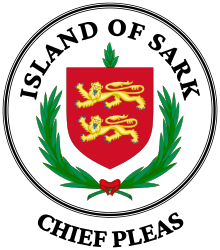
Seal of the Chief Pleas
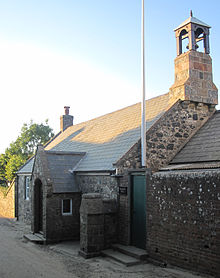
Chief Pleas meetings and court hearings are held here.
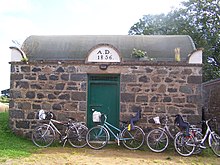
The prison
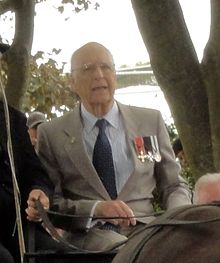
Seigneur John Michael Beaumont on a visit to the Prince of Wales in 2012.
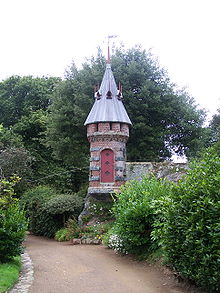
The pigeon tower on the grounds of the seigneurie - a symbol of the seigneur's right to breed pigeons
Search within the encyclopedia